15 Days of Chinese New Year Celebration For Kids
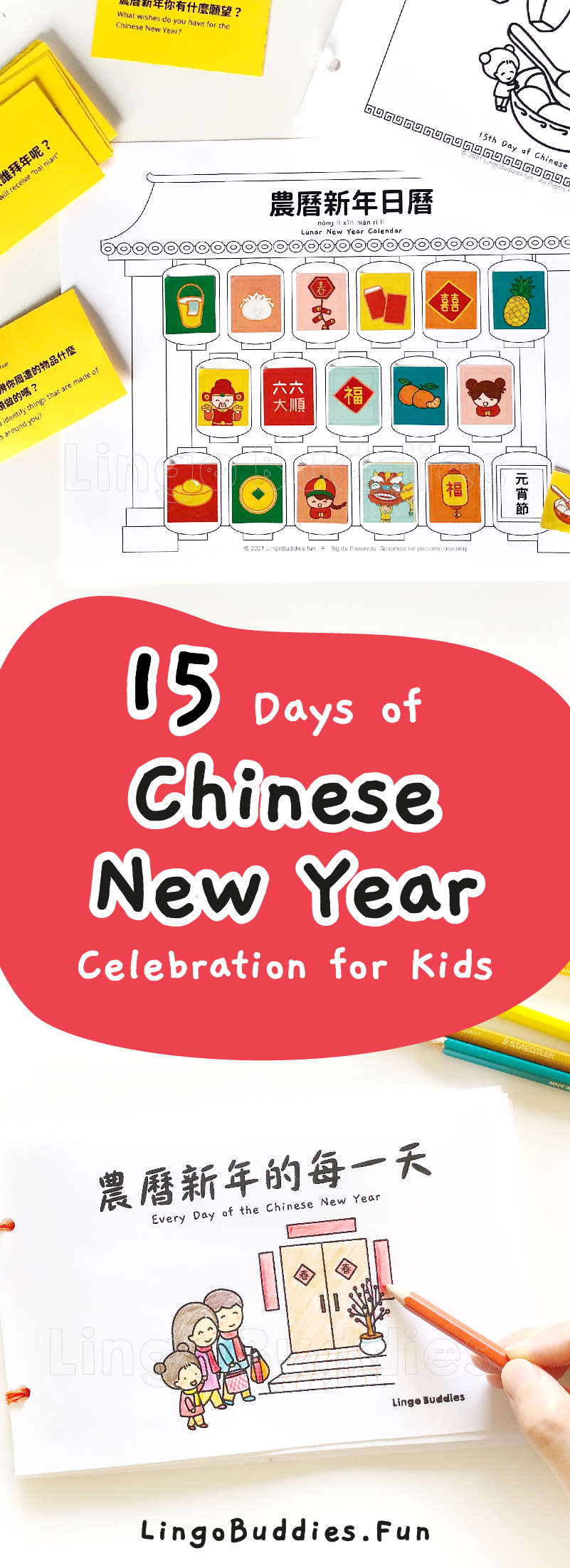
The Chinese New Year, also referred to as the Lunar New Year is the biggest holiday celebration that stretches for 15 days and more. It’s more than just celebrating a new beginning, it’s a celebration of hope, renewal, and gratitude. When you teach your child about the Chinese New Year, you broaden their perspective about the world and acceptance of different cultures. You can celebrate the Chinese New Year with your children with many fun hands-on activities. To deepen their connection and understanding of the Chinese New Year, try the Every Day of the Chinese New Year Book below, which gives you a glimpse into the fascinating traditions and customs that people practice during the 15 days of the Chinese New Year celebration.
How is Chinese New Year Celebrated?
Traditionally, the Chinese New Year celebration was heavily linked with agriculture. People prayed to heaven, earth, moon, stars, mountains, and rivers for a bountiful harvest. The focus of the Chinese New Year was on honoring the deities and ancestors to seek their continued protection of a good harvest and good fortune for the new year. Instead of a one-day celebration, the Chinese New Year festival is spread out for many days from the Chinese New Year Eve to the Lantern Festival, which is the 15th of the lunar new year. Each day in between has a traditional significance derived from the customs and legends of the past. There are also a handful of superstitions and taboos that people continue to honor today. For example, on the first day of the Lunar New Year, people are extra careful when handling ceramics and glass because breaking things means you are breaking the connection to good fortune. That said, if you do break something by accident, don’t worry, simply wrap it in red paper and repeat the auspicious phrase “suì suì píng ān" [歲歲平安 | 岁岁平安] which means peace and security all year round.
15 Days of Chinese New Year
House Cleaning | 大掃除
Before the first day of the Chinese New Year, families will declutter and clean the house to prepare for a fresh new beginning and to prevent doing any cleaning in the first few days of the New Year as it can “sweep away” New Year’s good fortune.
農曆新年的第一天之前,家家戶戶會整理和打掃房子,為迎接新的開始並防止在新年的頭幾天進行任何打掃,因為這會”掃”走新年的好運。
Chinese New Year Eve | 除夕
The Chinese New Year’s Eve is the last day of the year. This evening, families will gather to enjoy a sumptuous reunion dinner. The dishes have different meanings, for example, fish symbolizes abundance, and rice cake symbolizes higher achievement.
除夕是一年的最後一天。這個晚上家人會聚在一起享用豐盛的年夜飯。各式菜餚代表著不同的含意,比如說,魚象徵豐富(成語:年年有餘),年糕象徵更高的成就(成語:步步高升)。
1st Day | 初一
On the morning of the New Year, people will set off firecrackers to drive away bad spirit “Nian Shou”. Senior members of the family will hand out red envelopes to children and teenagers filled with money as a form of blessing. The act of paying a visit to wish others a happy new year is called “bai nian”.
新年的一大早,人們會放鞭炮趕走惡靈「年獸」。家中的長輩會給家中的兒童和青少年紅包,代表著對晚輩的祝福。這種拜訪祝新年快樂的行為稱為“拜年”。
2nd Day | 初二
On this day, married daughters go back home to visit their parents and bring gifts. In the old days, daughters don’t get to visit their families as often once they are married.
這一天出嫁的女兒會回娘家給父母和親人拜年。以前女兒出嫁後就很少有機會回家拜訪父母。
3rd Day | 初三
The 3rd is an ominous day in Chinese tradition, therefore people avoid having guests and going outside. Legends say the 3rd day is also the Rat Wedding Day so people go to bed early to give rats time for their wedding celebration.
初三在中國傳統裡是不吉利的一天,因此人們會避免接待客戶或外出。民間還傳說初三是老鼠娶親日,所以人們晚上會早早上床歇息,給老鼠們時間慶婚。
4th Day | 初四
The 4th is the day to welcome the visits from the Kitchen God and other deities. People will burn incense, light candles, and prepare offerings to welcome them.
初四是迎回灶神和其它神明的日子。人們會燒香,點蠟燭和準備祭品來迎接它們。
5th Day | 初五
The 5th is the birthday of the God of Wealth. People will hold elaborate feasts to celebrate this birthday to ensure the blessing of a wealthy year ahead.
初五是財神的生日,人們會舉辦盛宴祝壽保祐來年財源廣進。
6th Day | 初六
The 6th day has a tradition of sending away the Ghost of Poverty. On this day, each household throws away old clothes and trash accumulated since the first day of the New Year as a gesture to send away the Ghost of Poverty.
初六有送窮鬼的傳統。家家戶戶會在這天將從初一累積到現在的舊衣服和垃圾扔掉,預示送走窮鬼。
7th Day | 初七
The 7th day is commonly known as the “Day of Humans ”. According to legend, the ancient goddess “Nu Wa” created humans out of clay on this day. People eat noodles on this day because noodles signify good health and longevity.
初七是人日。相傳女神女娃是在這一天用泥土創造了人。人們會在這天吃麵條,因為麵條寓意著健康長壽。
8th Day | 初八
The 8th day is the birthday of millet, an important crop in ancient China. According to folk legends, if the weather is clear and bright today, it means this year will yield a bountiful harvest.
初八被認為是中國古代一種重要糧食—穀的生日。根據民間俗語,如果這一天的天氣晴朗明亮就預示著今年會有大豐收。
9th Day | 初九
The 9th day is the birthday of the Jade Emperor, known as “Tian Gong Sheng”. Elaborate ceremonies take place in temples to celebrate this day. Each household also prepares offerings.
初九是玉皇大帝的聖誕,稱為「天公生」。在寺廟會舉行盛大的祭天活動。各家各戶也會準備貢品祭祀玉帝。
10th Day | 初十
The 10th day is the birthday of the God of Stone. Stone was an important natural resource in the agricultural society of ancient China. On this day, it’s forbidden to move any stone made tools. Families burn incense and candles to honor the God of Stone.
初十是石頭的生日,在中國古代農業社會石頭是重要的自然資源。這一天石製工具都不能動。家家戶戶會燒香點蠟燭來祭祀石頭。
11th Day | 初十一
The 11th day people make offerings to “Zi Gu”, the Guardian Angel for Vulnerable Women. She protects oppressed women all around the world.
初十一大家會敬奉紫姑—弱女子的保護神。她保護普天之下的受壓迫的女性。
12th Day | 初十二
Once the 12th arrives, people begin the preparation work for the Lantern Festival. In the early days, the first thing was to build the lantern shack.
初十二一來到,人們便開始做元宵賞燈的準備工作。在早期,第一件事就是搭蓋燈棚。
13th Day | 初十三
On the 13th people continue with the preparation for the Lantern Festival. On this day, people will light up the lanterns they made or bought.
初十三大家繼續準備元宵節。這一天人們會將自作或購買的燈籠點起。
14th Day | 初十四
On the evening of the 14th, people bring their own lanterns to attend lantern fairs to enjoy various kinds of lanterns. To boost the festive atmosphere, some lanterns have riddles written on them for people to guess.
初十四的晚上,大家提著燈籠到燈會欣賞各式各樣的燈籠。有些燈籠上會寫謎語供人猜來增加節日氣氛。
15th Day | 初十五 | 元宵節
The 15th is also called the Lantern Festival. This marks the peak of the Chinese New Year celebration. The whole family will gather together to gaze at the full moon, enjoy the beautiful lanterns, and eat a classic dessert made with glutinous rice flour called “yuan xiao”. Eating “yuan xiao” is to wish the whole family stay united, harmonious, and happy. In other regions, one can see the sky lantern tradition. People light up hot air balloon shaped paper lanterns and use the principle of hot air to float them. The higher the sky lanterns float, the better the luck they will bring.
初十五也被稱為是元宵節。這是農曆新年慶祝活動的高潮。全家人會一同賞月,欣賞繽紛多彩的燈籠和吃由糯米粉做成的傳統點心—元宵。吃元宵是希望全家人團圓,和睦,幸福。在其他地方也可以看到放天燈的習俗。人們將熱氣球形狀的紙燈籠點起,利用熱空氣上升的原理將天燈升起。放得越高,運氣就會越高。
How to Celebrate with Kids
There are so many customs and traditions, so how do you impart this rich knowledge about the Chinese New Year to your kids? It's easy! I made a collection of hands-on activities that complement each other to make it fun for your kids to learn about the 15 days of Chinese New Year.
To start, make a Chinese New Year Advent Calendar with your kids. For each day, cover a lantern with the corresponding sticker. At the end of 15 days, you will have a colorful display of lanterns. You can also print out these Chinese New Year Date Labels in English and Chinese as a visual cue.
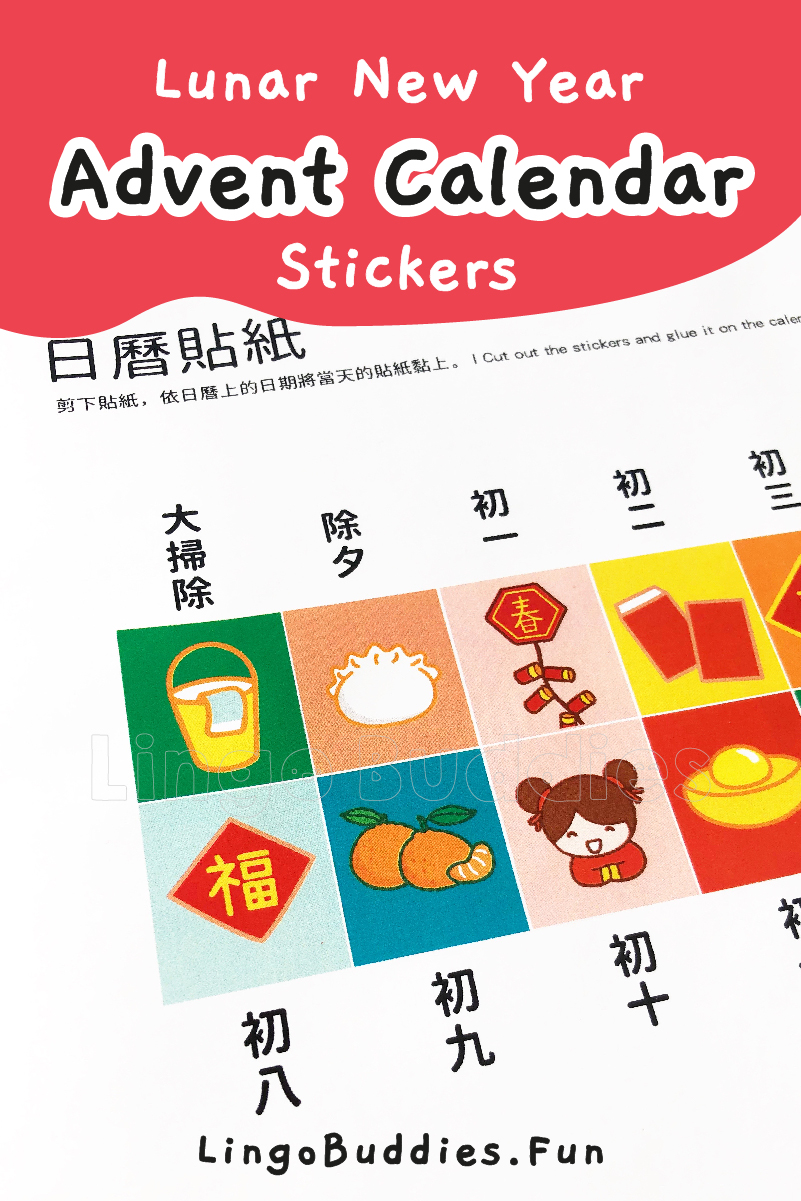
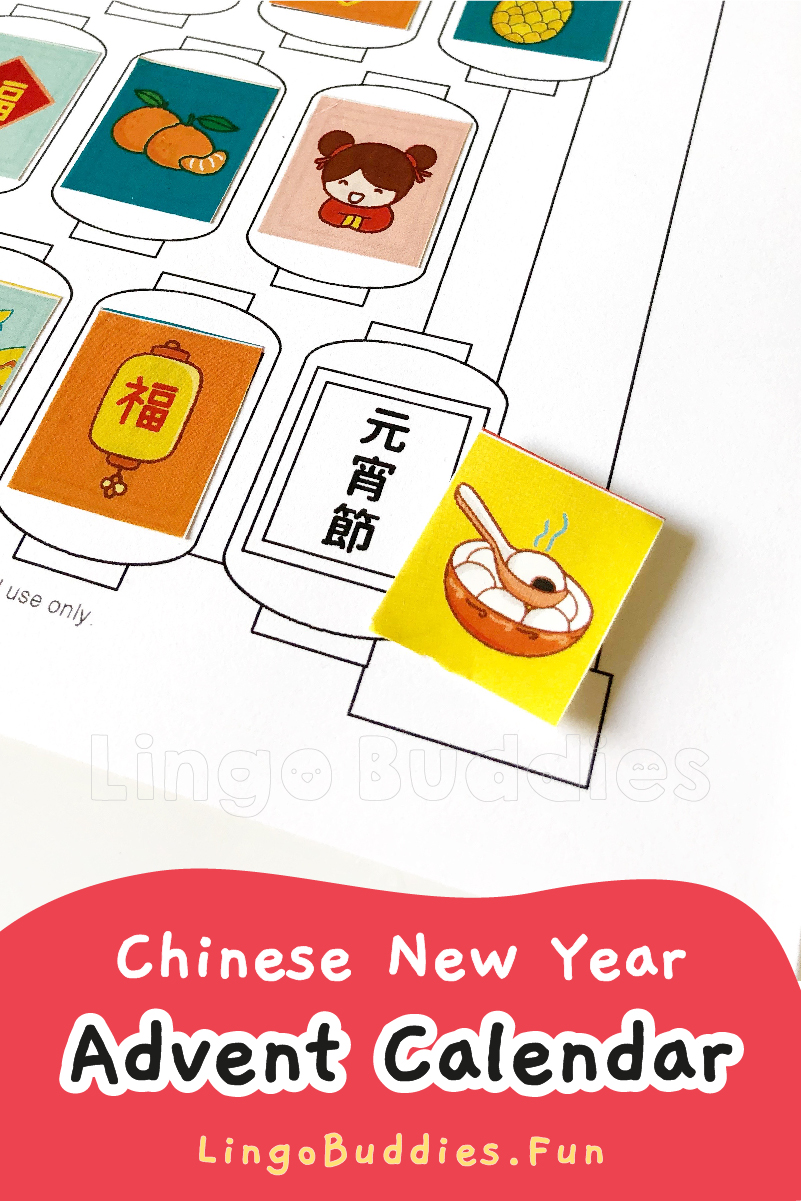
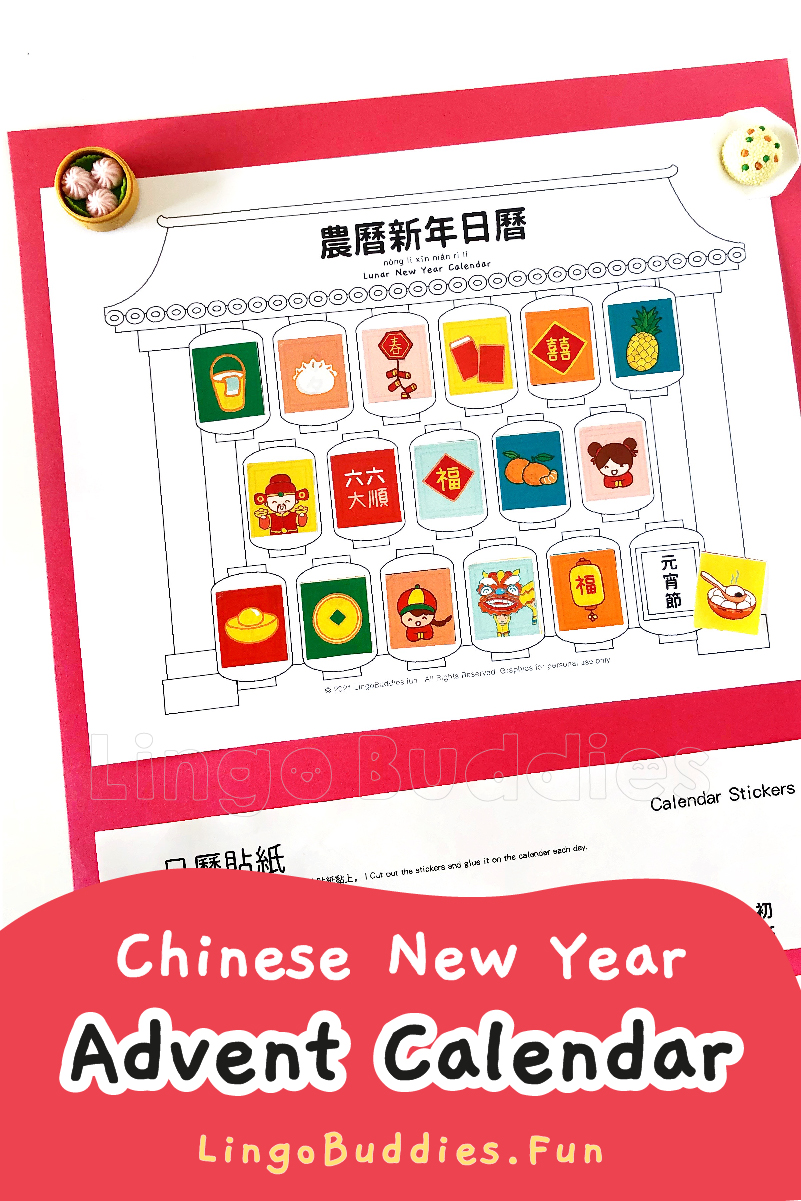
Next, it's time to make this book! In this Every Day of the Chinese New Year Coloring book, you will discover the highlights of customs and traditions that people follow each day. In summary, the beginning of the Chinese New Year is all about spending time with family, like the reunion dinner and visiting parents and grandparents. After the 5th, most of the superstitions and taboos are lifted and the rest of the days are about paying tribute to the deities and praying for their blessings in return. Finally, from the 12th until the 15th, it’s all about getting ready for the Lantern Festival, which marks the big finale of the Chinese New Year celebration.
Every Day of the Chinese New Year Coloring Book with Customs and Traditions
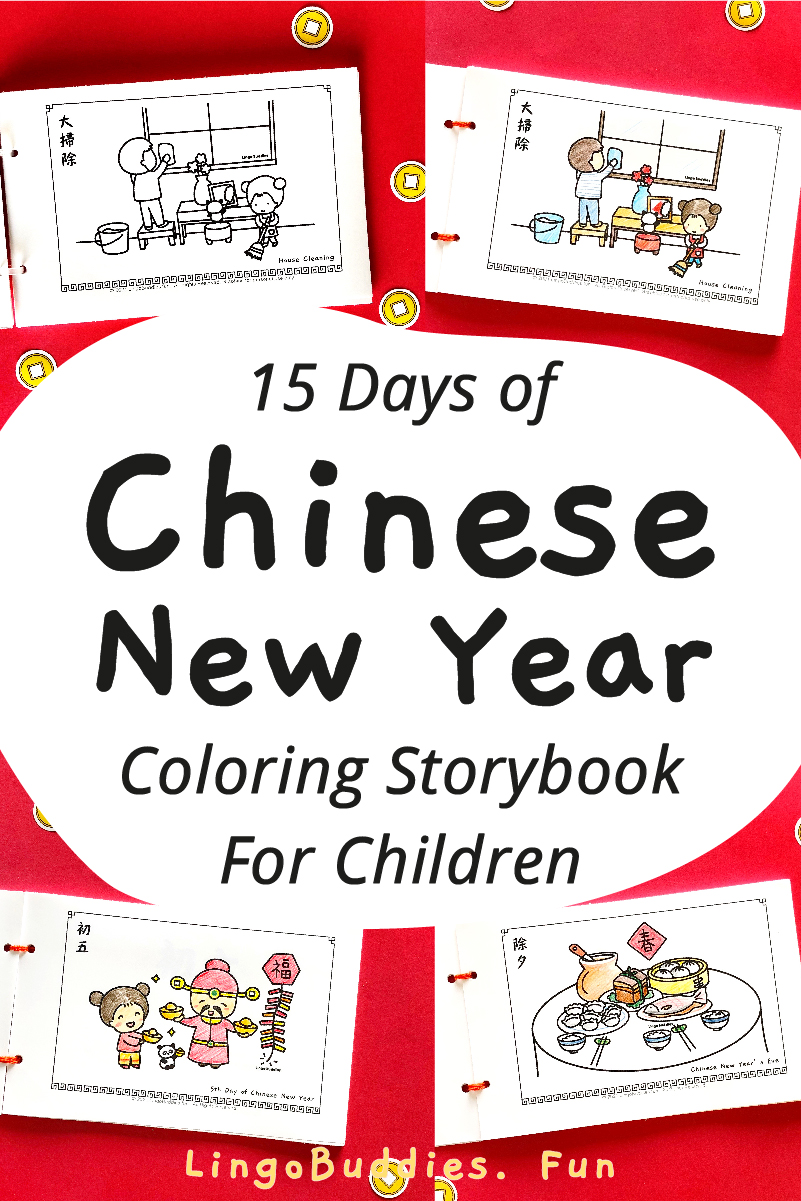
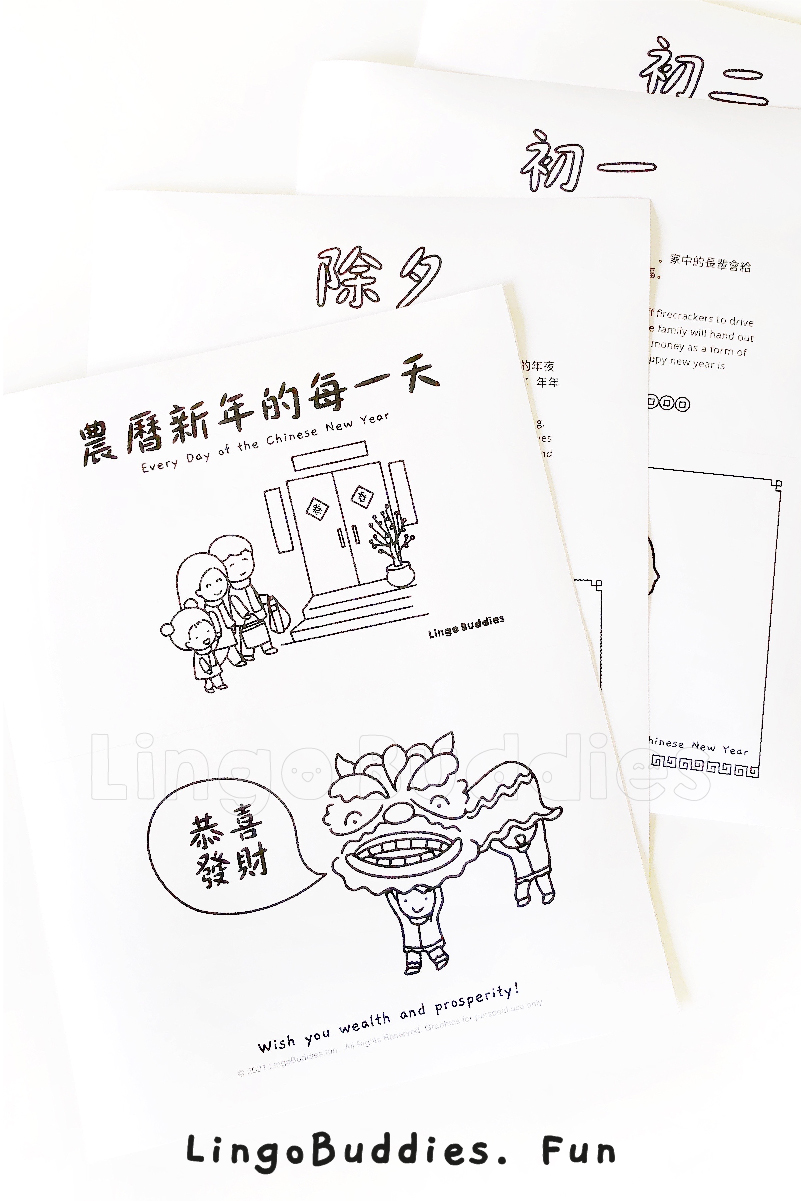
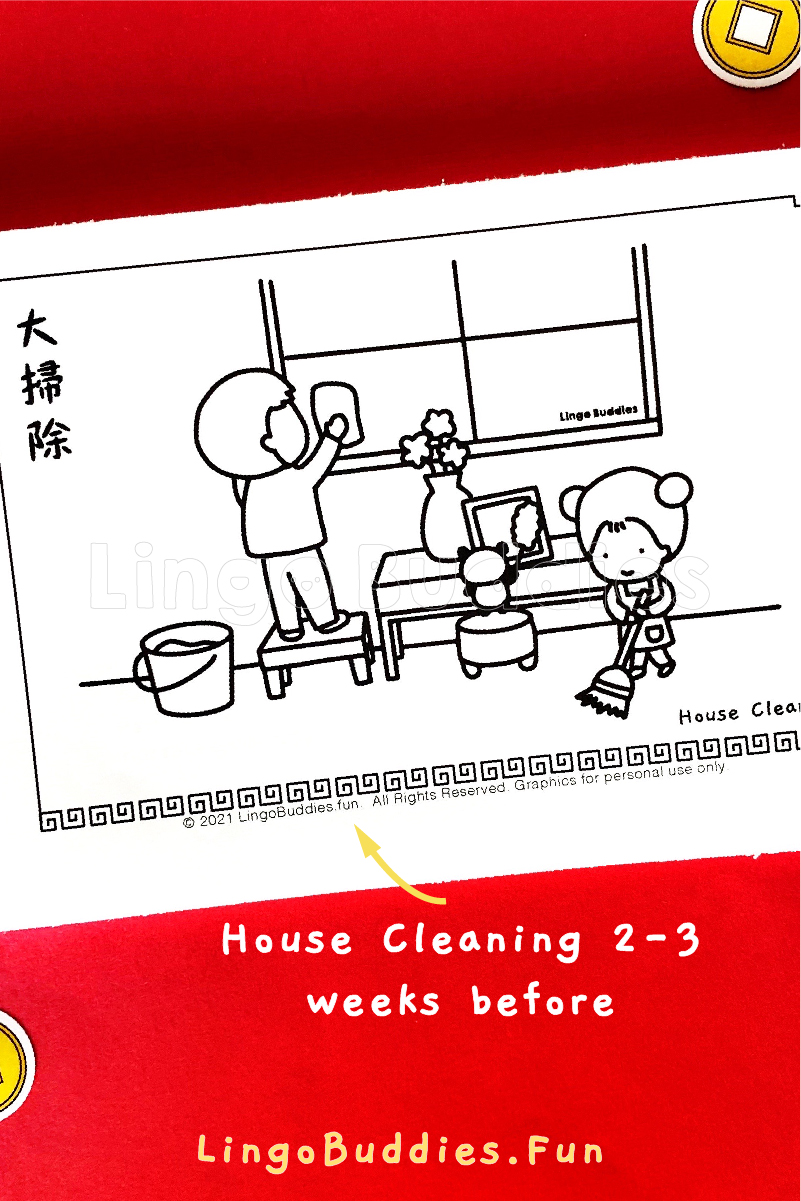
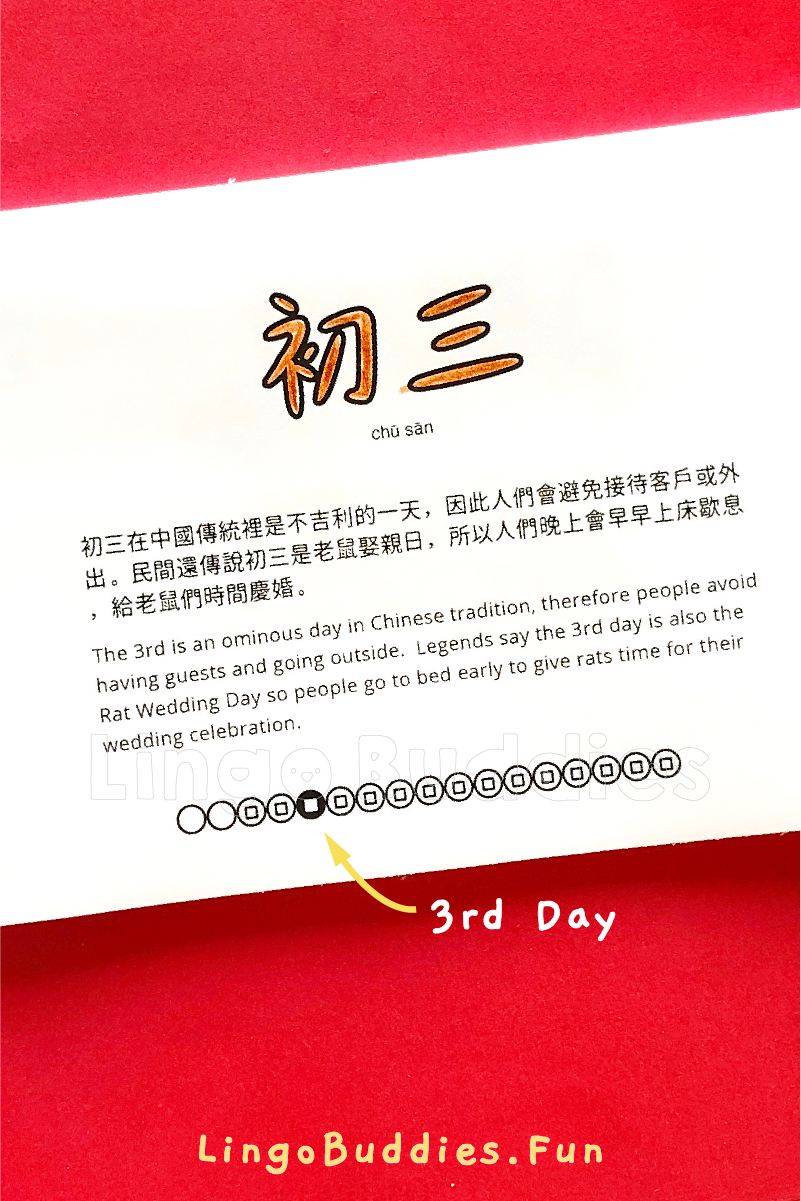
How to Make This Book
There are a total of 19 pages that need to be cut in half and bound together. It's super easy to make. I used a thread to bind the pages, but you can also use any binder rings you have on hand.
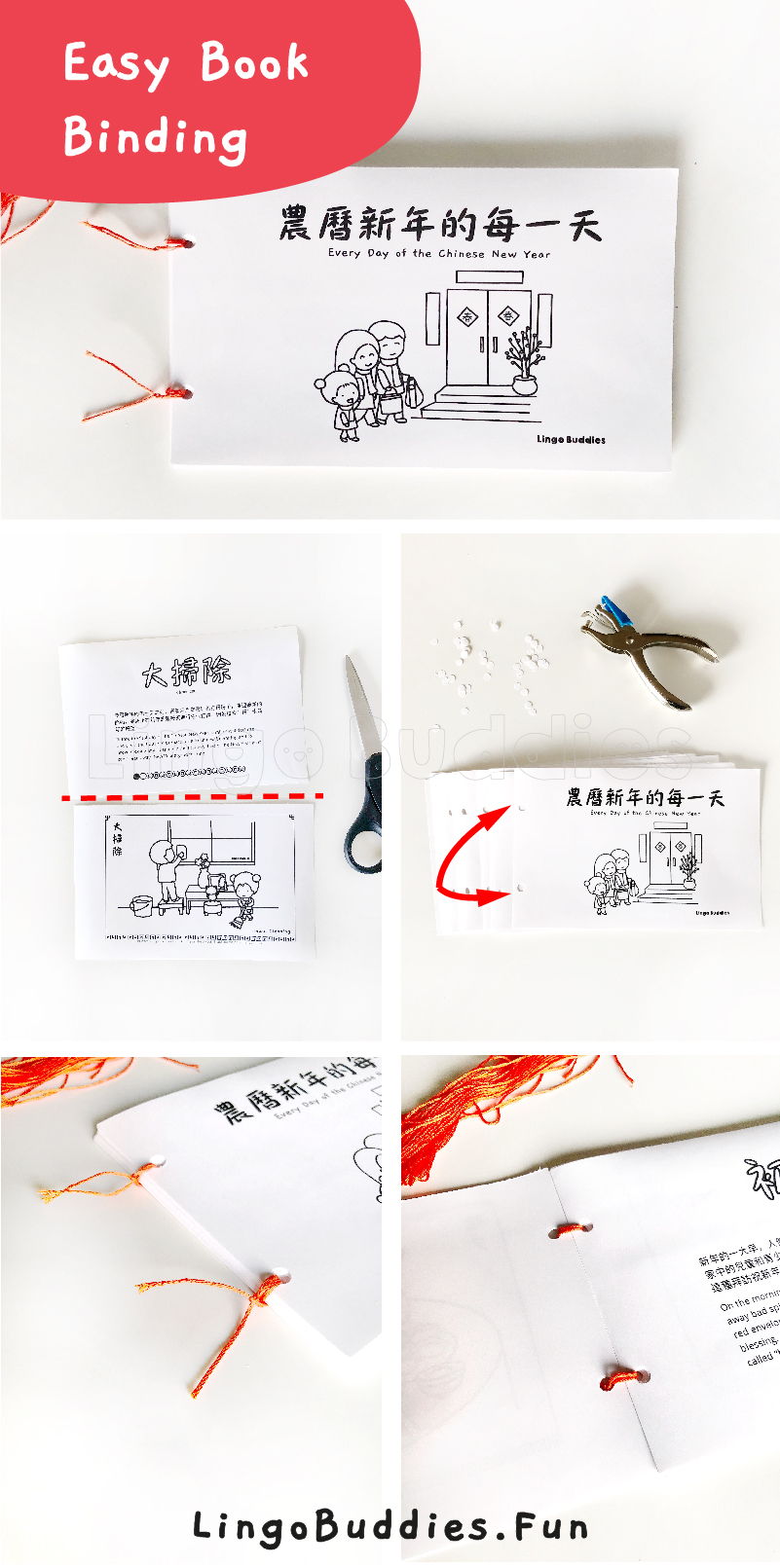
After you have made the book, you can read a page a day and have your child color in illustrations.
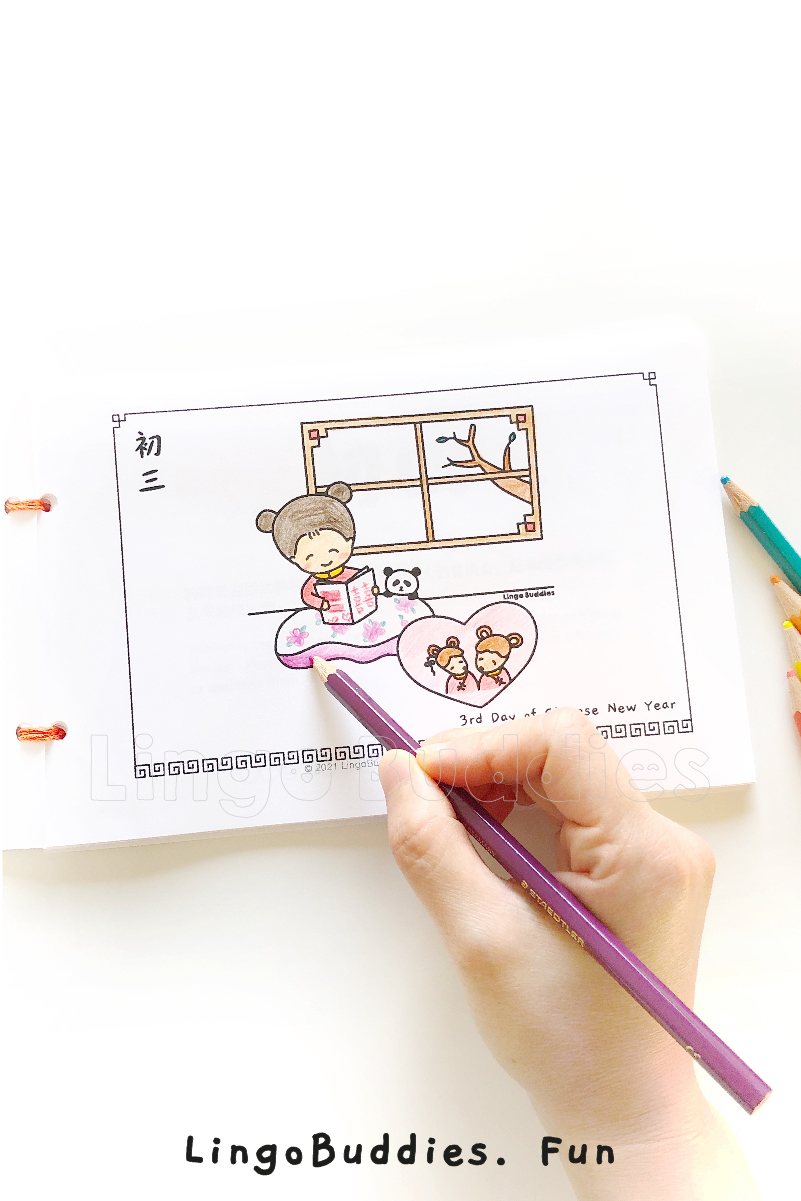

Pair the book with this set of question cards that are inspired by the traditions and customs. Each day ask your child a question after you have read the book.
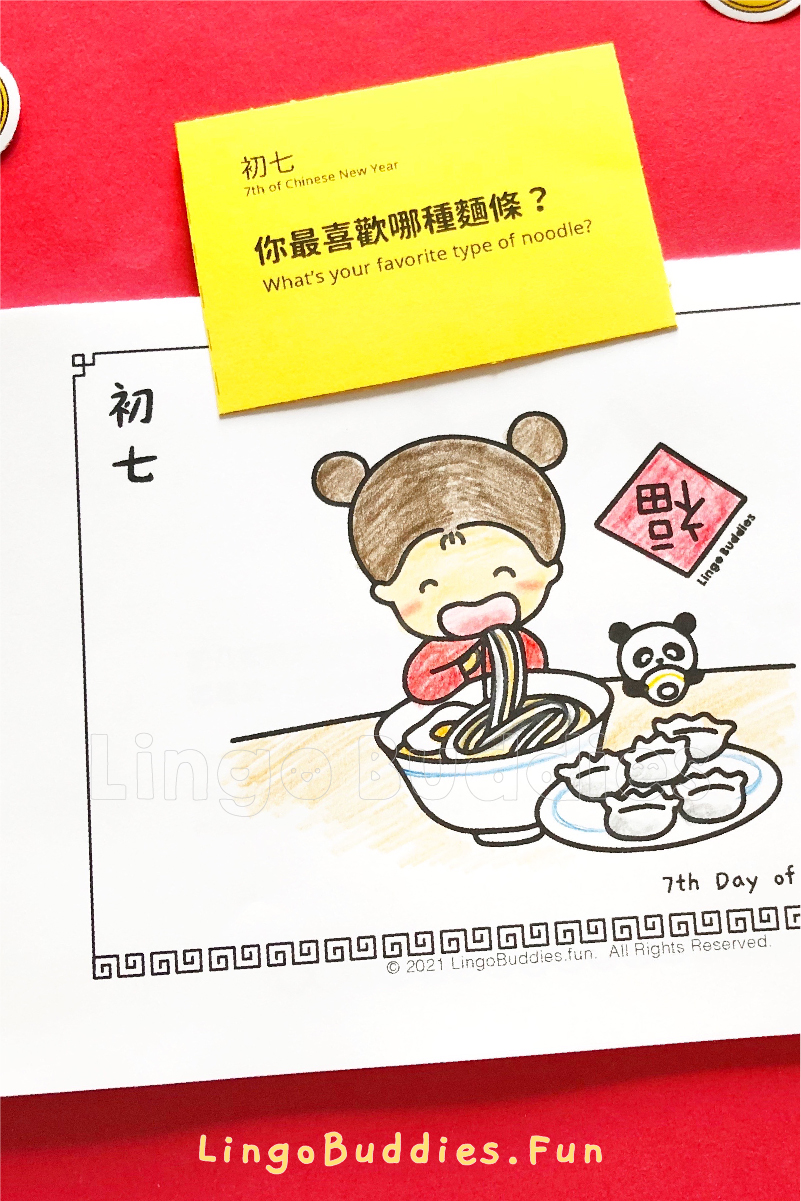
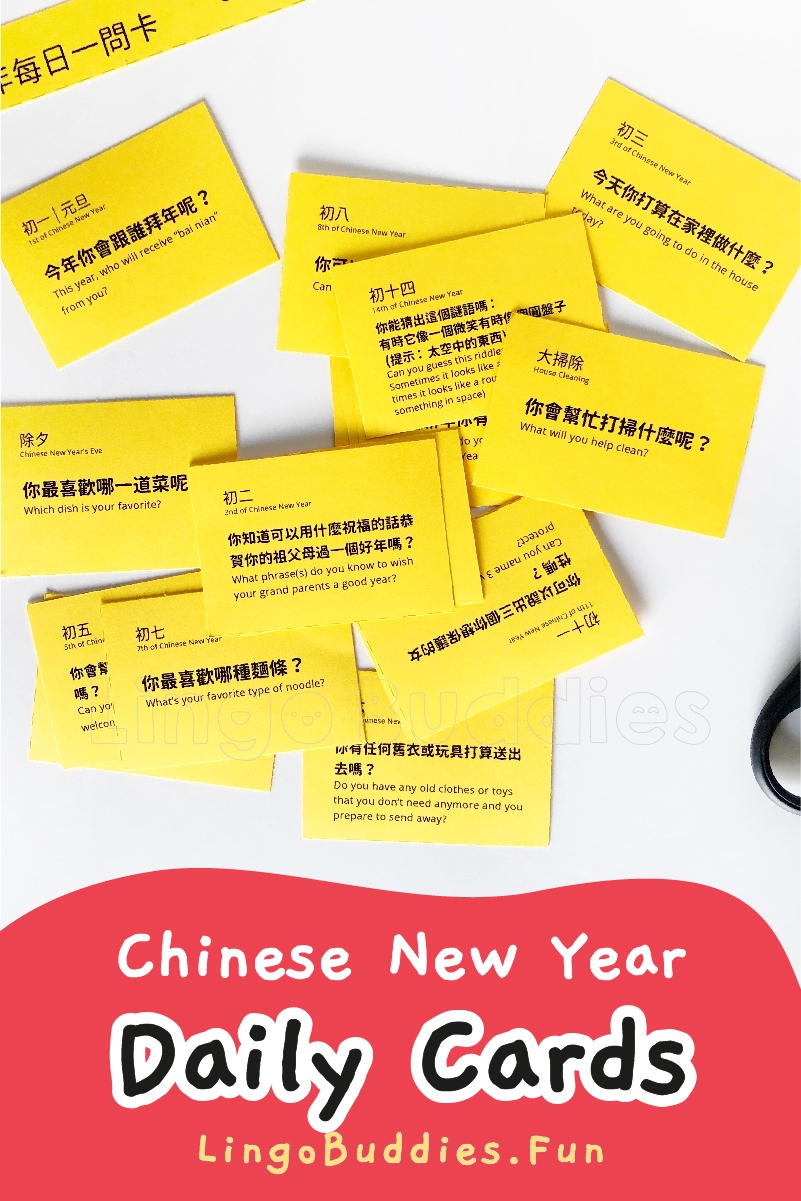
Reflection
Putting together all the materials for the Chinese New year has been a delightful journey. Growing up in Taiwan, I followed many of these traditions without understanding how they came about. During my research, I have learned so much about why things were done a certain way. All these customs and traditions I used to follow start to make more sense and have more meaning. For example, on the 2nd day of the new year, it was customary that we all got up at 2 or 3 am in the morning to get into the car so my dad could drive us down south to visit my grandparents on my mom’s side. We woke up early to avoid the traffic jam because literally, every family would be on the road driving to the parents of the married daughter. I had no idea why there needed to be a day assigned for married daughters to visit their parents, but now I understand why. In the old days, once a woman married, she became the responsibility of the husband’s family and was considered “spilled water” as depicted in the Chinese idiom, “married daughter are like spilled water” [嫁出去的女兒,潑出去的水 | 嫁出去的女儿,泼出去的水]. Therefore, the 2nd of the Chinese New Year is the only day a married daughter could visit her parents legitimately with her husband and be welcomed by her own family. It’s really sad for me to realize this inequality, but I am glad things have changed and I can visit my parents anytime by myself even though the first thing they almost always ask me is, “where’s Ken? (my husband) 🤣
Wrap Up
Anyways, I hope you will enjoy making this book with your kids. Whether you want to color one page per day or color them all in as an afternoon family activity, this book can be used year after year. Don't forget to print out the interactive question cards that complement this book. The question cards will help deepen your kids’ connection with the traditional significance of each day. All the materials are available in traditional and simplified Chinese.
Happy New Year!
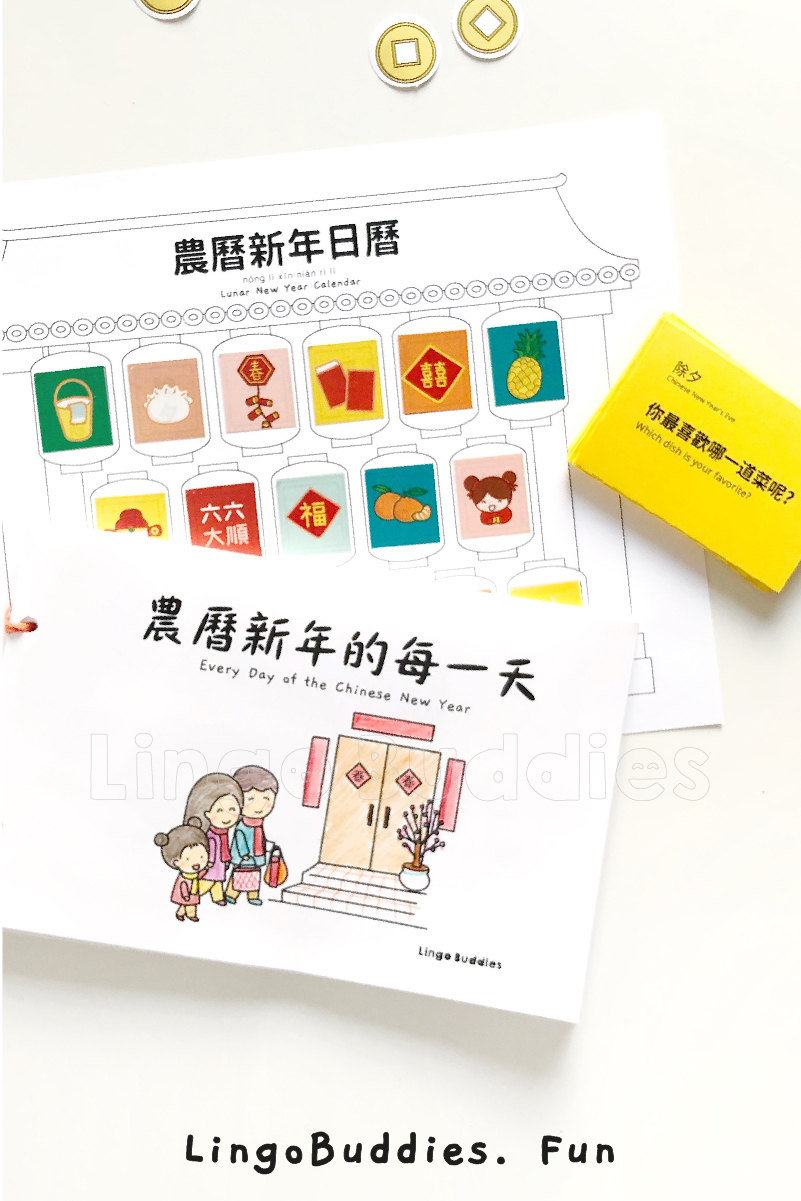
More Chinese New Year Activities
If you are looking for more printable activities on the Chinese New Year, stop by the Resource Library and click on the topic "Chinese Holidays". And visit our post on the 15 Chinese New Year crafts and activities for kids.


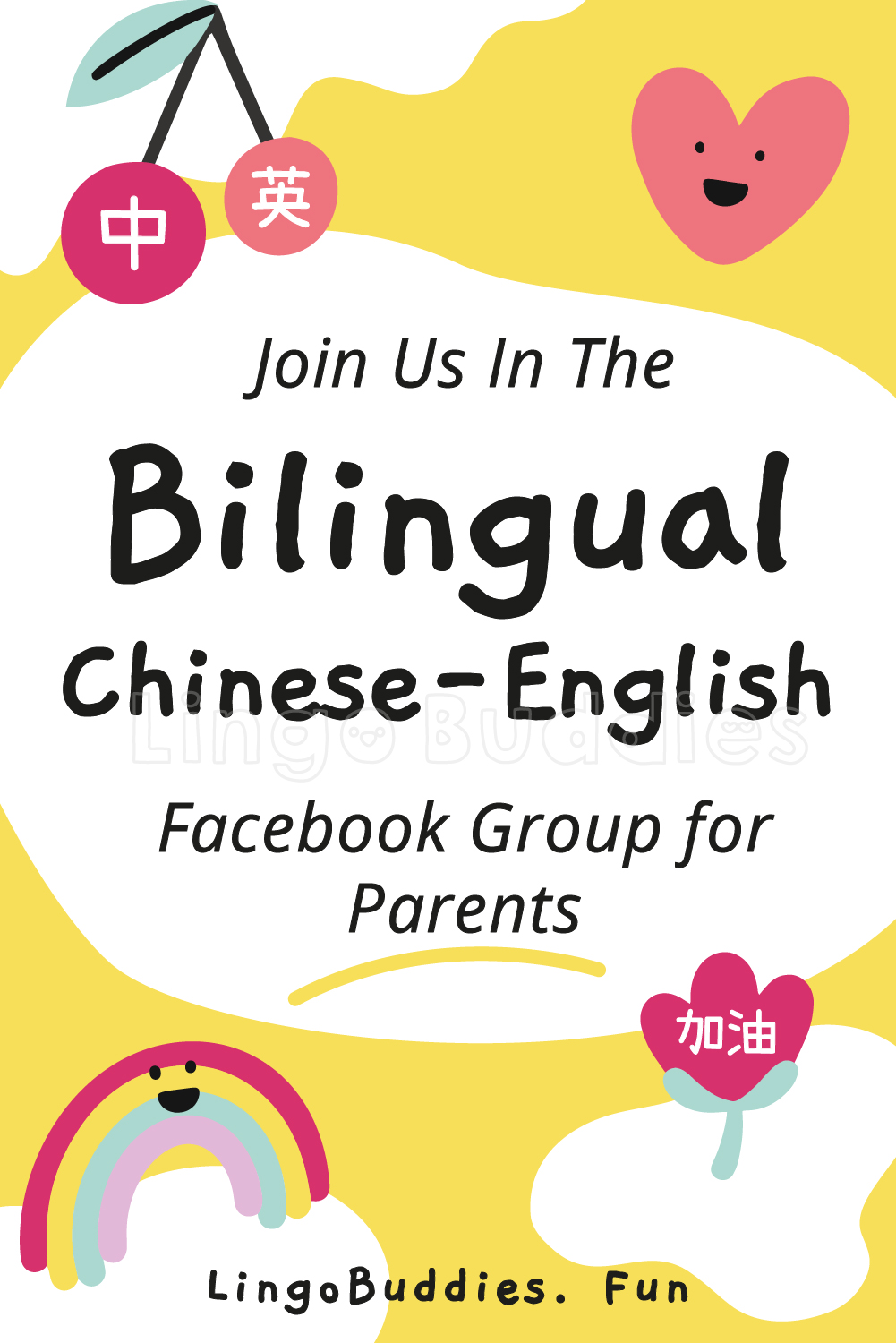
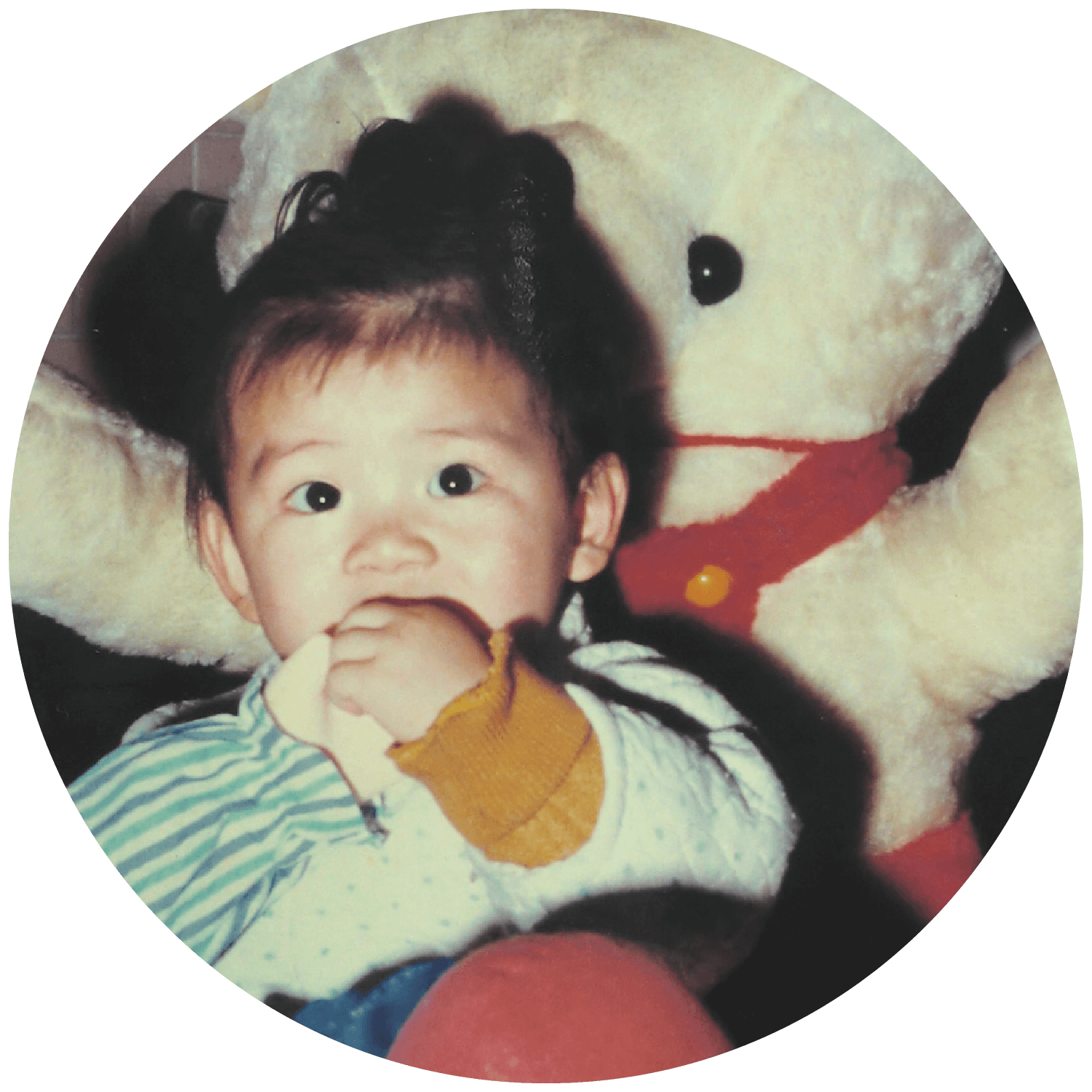
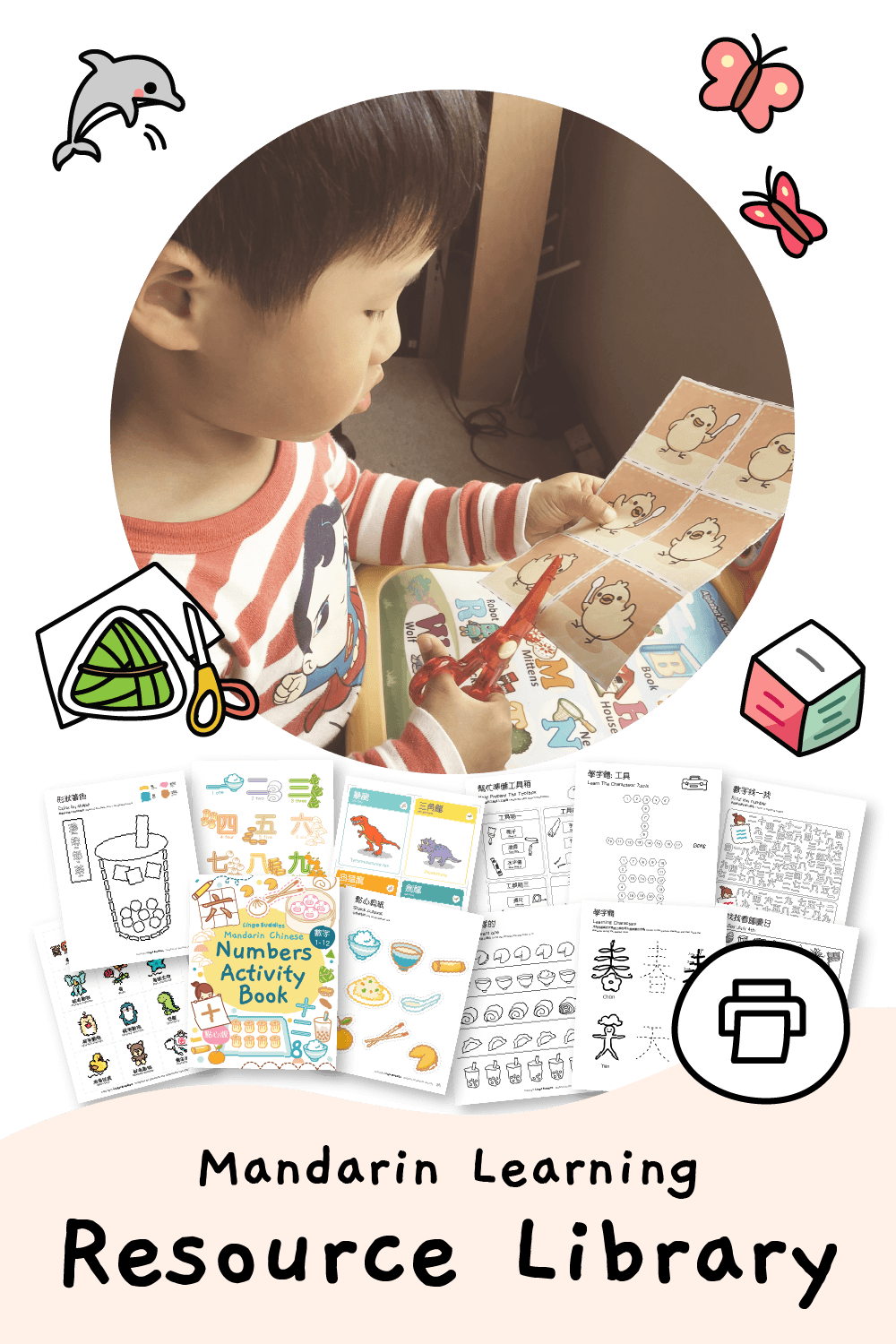
cool stuff. I wish you have simplified characters version for all your projects would be the best.
Hi Tina, thank you for liking our materials. Starting this all of our new contents are in both simplified and traditonal Chinese!! We are also working on updating all the original ones to have simplified as well. So stay tuned!